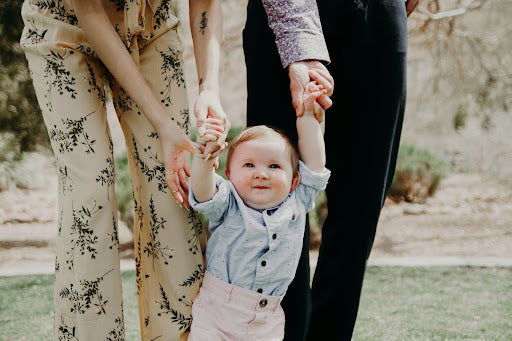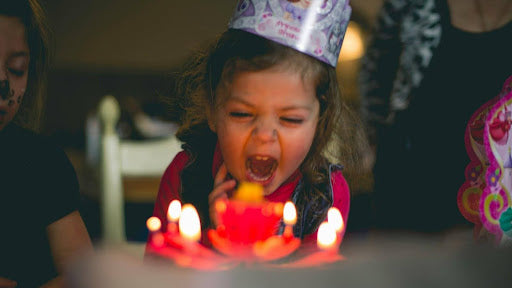Having a baby at home is such wonderful news, but when everybody warns you of sleepless nights, the stress starts haunting you. Developing a baby's sleep schedule is one of the most priceless gifts new parents can give their child. Maintaining a newborn’s sleep schedule is very crucial for your child's growth, development, and general health. Although it can be difficult to get into a regular sleep schedule, don't worry! You'll be well on your way to helping your baby sleep quietly through the night if you follow this detailed guide. Keep on reading to know how you can regularise baby sleep timing.
Importance Of Proper Sleep For Baby’s Growth & Development
Brain Development
Babies’ sleep time is crucial to their brain development. The brain consolidates the knowledge it has acquired throughout the day when we sleep, strengthening memory and forging new neural connections.
Physical Growth
Growth hormones are released by the body during deep sleep to support bone growth, muscular growth, and tissue repair. Babies' bodies are actively growing as they sleep, and establishing proper baby sleep patterns enables them to maximise this crucial stage of growth.
Emotional Development
Neurotransmitters like serotonin and dopamine, which are crucial for maintaining steady moods and emotions, are produced when baby sleep time is regulated. (1) A baby that gets enough sleep is probably happy and has better emotional control.
Build Immune System
Infection-fighting proteins are produced by newborns' bodies while they sleep, boosting their immune response. This helps keep them healthy and ensures that they heal more quickly when they do get sick.
Hormonal Development
A baby's body's ability to regulate its numerous hormones depends on getting enough sleep. Sleep patterns affect hormones like cortisol, insulin and leptin. It is essential for a healthy metabolism, appetite control, and stress management that these hormones are properly regulated.
Nurturing Naptime: Tips For A Successful Sleep Schedule
The best time to start building a baby’s sleep schedule is when they are 2 months old. By now you have understood their eating and sleeping patterns and now you can better plan on building an effective baby sleep routine.
Decide On Your Baby's Day-Night Sleep Schedule
For building a good newborn sleep schedule at night, it’s important you pay due attention to their daytime sleep schedules and other activities. Play with your baby in the daytime the most to keep them happy and playful. Try to keep them awake post feeding but if they are sleeping or dozing off, let them be.
Feed them in a room with little or no light. Dim the lights at night and avoid any noise so that they can develop it as a habit for sleeping.
Post Two Months Don't Wake Your Baby For Feed
You don't need to wake your kid up in the middle of the night to feed them if they are gaining weight properly. Your infant must establish their own sleep schedule. They won't need to wake up at night to eat after they start eating more throughout the day. Waking them up frequently might disturb your baby’s sleep patterns.
Understand Your Baby's Signs of Tiredness
There are some signs that are majorly indicated by your baby if they are feeling sleepy. Try to keep a watch on these signs and get your baby to sleep. Some of the major indications are:
- Eye Rubbing
- Yawning
- Fussing
Put your child to bed as soon as they are tired enough. Babies who are overtired have more difficulty falling and keeping asleep. Try to anticipate their needs by keeping an eye out for indications of sleepiness before they become fussy and irritable.
Establish A Pre-Bedtime Routine
Routines give newborns a sense of security and support their circadian rhythms, which helps babies know when it's time to sleep. A soothing feeding and cuddling session before bed, a bath, a book, a massage, and a lullaby are all recommended for babies. Keep all the bedtime essentials handy to avoid any haste at the last moment.
Don't React Hastily To Any Noise
When babies are about three months old, they can begin to soothe themselves, so if your baby fusses at night or during a nap, don't rush to take them up. Wait a few minutes to see if they can fall asleep again on their own instead. Try to check on them without picking up if they fuss more.
Arrange For Baby Sleep Sacks
A sleep sack works similarly to sleeping bags but for infants. It promotes safe and healthy sleep by keeping your little one warm, cosy, and secure throughout the night. Unlike blankets, the sleep sack doesn’t fall off from your kid's body. They serve as a wearable blanket with openings for your baby's head and arms.

Lastly, Be Patient And Flexible
Before setting a newborn baby sleeping time, you should keep in mind that children are unpredictable, thus your baby's sleep schedule will change with time. It may take some trial and error to determine what is best for your kid. Hence, do not be stern while setting baby sleep patterns and follow a flexible approach.
In conclusion, developing and implementing a baby's sleep schedule is an important part of parenting. It not only encourages sound sleep habits in your child but also makes sure you receive the rest you require. Remember to establish a relaxing bedtime routine, provide a comfortable sleeping environment, be mindful of nap times, be consistent with overnight feedings, and maintain patience and flexibility throughout the process. Your infant will be well on their way to a tranquil and restful sleep habit if you follow these six simple steps.
You can also get your hands on some essential baby products and sleep sacks from Mama & Peaches that are made to make your parenting journey comfortable.
Enjoy your sleep!
Frequently Asked Questions On The Importance of Baby Sleep Schedule
How do I start my baby's sleep schedule?
You can start setting your baby’s sleep schedule by keeping a check on their routine activities, setting up their room and buying appropriate bedtime essentials.
Are any specific baby accessories required for sound sleep for my baby?
A baby cot, warm blankets, diapers, nightsuits, sleep sacks, swaddles, etc. are some of the essential accessories you require to set your baby to sleep.
At what age do babies get on a sleep schedule?
The best time to set your newborn’s sleep schedule is when they are 2 months old.



